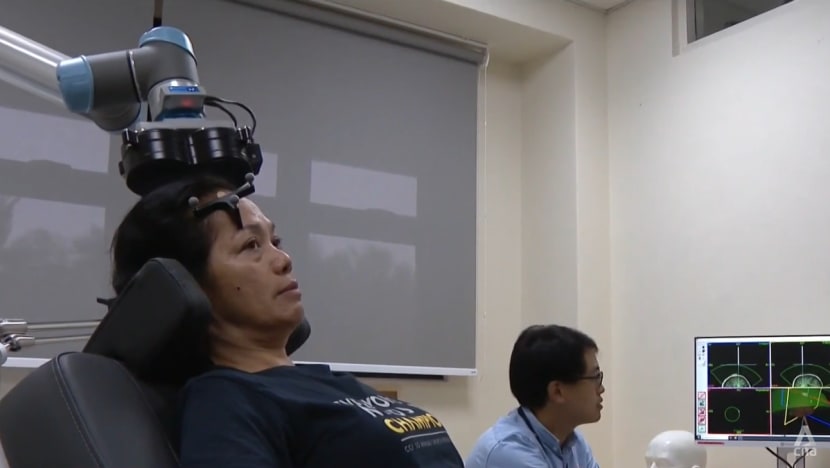People with treatment-resistant depression could get more personalised care in the future
Such patients may see an alleviation but not a remission in their symptoms, despite being compliant in taking their antidepressants.

A new method where doctors will be able to zoom in and stimulate a specific spot in a patient's brain to attempt to treat the treatment-resistant depression is under trial.

This audio is generated by an AI tool.
SINGAPORE: Patients with depression who have not responded to conventional psychiatric treatment may soon be able to get more personalised care, thanks to a new method currently being trialled.
Doctors will be able to zoom in and stimulate a specific spot in a patient's brain to attempt to treat the treatment-resistant depression, by using an individualised functional MRI to find the ideal location. The existing method treats the same spot for all patients.
Two clinical pilots on the new treatment are being conducted by the Institute of Mental Health (IMH) in collaboration with National University of Singapore’s Yong Loo Lin School of Medicine. They will run concurrently till March 2026.
A first in the region, the trials will study the efficacy of such treatment called personalised Transcranial Magnetic Stimulation (TMS), IMH and NUS said in a media statement on Friday (Apr 12).
“The hope is if it works for treatment-resistant depression, it will be extended to other hard-to-treat conditions, perhaps things like obsessive compulsive disorder, post-traumatic stress disorder, autism and other conditions,” said Dr Tor Phern Chern, senior consultant at IMH’s Department of Mood & Anxiety, and head of Neurostimulation Service.
WHO THE TRIALS WILL BENEFIT
Both trials will only recruit individuals who have undergone conventional psychiatric treatment for depression and failed to achieve remission, and they will be screened for suitability.
Depression is the most common psychiatric disorder among adults in Singapore. The 2016 Singapore Mental Health Study showed that 6.3 per cent of the Singapore adult population – or one in 16 adults aged 18 and above – has experienced the disorder at some point in their lifetime.
However, depression is a treatable condition. Mild cases may be managed with psychotherapy, while moderate to severe cases are typically managed with antidepressant medication to alleviate the symptoms, the media statement said.
But some patients do not respond well to medication, failing two courses of different drug treatments – where a course would consist of adequate doses taken over a four- to eight-week duration, and with adequate adherence during a major depressive episode.
Such patients may see an alleviation but not a remission in their symptoms despite having been compliant with taking their antidepressants. Clinically, this is known as treatment-resistant depression.
There are no local studies on the prevalence of such depression.
HOW IT WORKS
“For everyone, the pattern of brain networks is different. So, for every person, where (we) should be targeting (for treatment) is different,” said Associate Professor Thomas Yeo from the Centre for Sleep and Cognition at NUS.
Assoc Prof Yeo, along with a research fellow, developed an algorithm to identify the unique spot in the brain. He added that with improvements in technology, a scan will take up to just 20 minutes and will produce better images of the brain compared with 20 years ago.
“Based on algorithms developed by my group, we're able to extract individual brain networks with a limited quantity of data. So this means that with just 10 or 20 minutes of MRI scan, we're able to estimate very high-quality personalised brain networks,” he said.
“And with these personalised brain networks, we can extract a precise location on the front of the brain for brain stimulation for treating treatment-resistant depression.”
The clinical trials are modelled after the Stanford Accelerated Intelligent Neuromodulation Therapy (SAINT). In pilots done with Americans who had treatment-resistant depression, about 80 per cent of patients achieved remission with the therapy.
Dr Tor said that the research will also go some way in reducing the stigma around mental illness.
“If we can localise the part of the brain … do something to it, and make the depression go away, that shows definitively that depression is a biological illness and not something that just lives in your head,” he said.
The two trials are funded by a grant of S$1 million (US$735 million) each from Temasek Foundation and the National Medical Research Council, which was set up by the Ministry of Health to fund medical research.




















